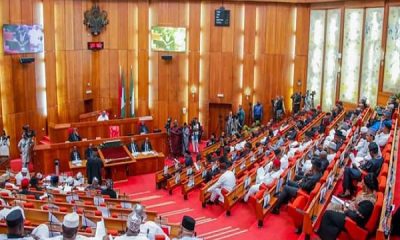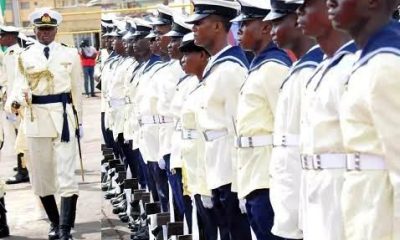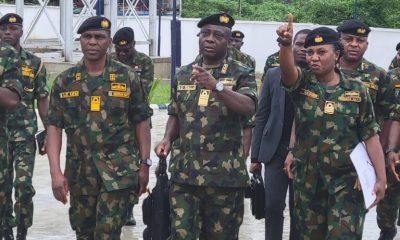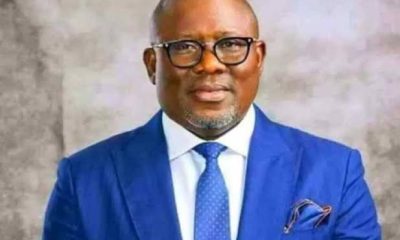Headline
Product on-board impounded MT PRAISEL not stolen crude oil – Navy

Product on board a vessel, MT PRAISEL, impounded by Tantita Security Service Ltd. (a private security company, engaged by the Nigerian National Petroleum Company, NNPCL), was not stolen crude oil, the Navy has declared.
The declaration was made on Sunday in Abuja by the Director of Naval Information, Commodore Adedotun Ayo-Vaughan.
Reacting to the declaration, however, Tantita Security Services Nigeria Ltd. alleged that Navy’s declaration was a cover-up even as it admitted that the product on the vessel was not stolen crude oil.
Ayo-Vaughan had on Friday reacted to an allegation in respect of the said vessel which was reported to be conveying stolen crude oil with naval escorts on-board and apprehended by the private security outfit.
He stated that the Nigerian Midstream and Downstream Petroleum Regulatory Authority (NMDPRA) gave approval to MT PRAISEL to load 1,114,721 litres of High Pour Fuel Oil (HPFO).
The product was to be loaded from Greenmac Energy Storage/Tarus Jetty, at Koko from July 26 to Aug. 8.
He added that due to the allegation of crude oil theft, samples of the product on the vessel were collected in line with laid-down procedures for laboratory analysis and verification of claim.
According to Ayo-Vaughan, results of the laboratory analysis of the product on-board MT PRAISEL by all agencies including NMDPRA indicates that it displayed properties consistent with Nigerian industrial standard specification for HPFO.
“This result, therefore, proves that the allegation and suspicion was totally wrong, unfounded, and perhaps mischievous.
“The intelligence report which TSSL claimed to have received in respect of the vessel and its product is equally wrong.
“This singular incident brings to the fore the high-handedness and unprofessional conduct of TSSL with its attendant negative consequences for the supplier and buyer of the product.
“It also has negative consequences for the vessel hired to convey the product and other parties involved in the legitimate business,’’ the Navy’s spokesman stressed.
Ayo-Vaughan reiterated the commitment of the Nigerian Navy to support efforts to halt economic saboteurs and fight against crude oil theft within the ambit of the law and with the best professional conduct.
He stressed that proper precaution must be adhered to by all stakeholders to avoid unnecessary impediment to legitimate commercial activities and businesses in the maritime environment.
According to him maritime security issues entails more than spontaneous actions from insufficient and unverified information.
“The resultant wrong responses have direct impact on the nation’s economy; hence it must be handled dispassionately and professionally.
“All stakeholders and players within the Nigerian maritime environment are advised to adopt the same posture in the overall interest of the nation,” Ayo-Vaughan stated.
Reacting to the position of the Navy, however, TSSNL admitted that NMDPRA approved that MT PRAISEL should load 1,114,721 Litres of HPFO from Greenmac Energy Storage/Tarus Jetty Koko on the said dates.
TSSNL is operated by ex-militant leader, Mr Government Ekpemupolo (aka Tompolo).
He said: “on Aug. 1, 2023, Tantita received credible intelligence report that a vessel, which had got NMDPRA approval to deliver HPFO from Koko to Lagos Offshore would proceed in the opposite direction.
“On Aug. 2, 2023, Tantita operatives approached the MT PRAISEL as it made its way through a creek in Delta, off the Benin River.
“On board the vessel were naval personnel, while the Tantita inspection crew included officers and men of Operation Delta Safe (the inter-service task force for fighting crude oil theft).
“The intelligence suggested that the vessel ought to be sailing to Lagos, but the master of the vessel showed he was sailing to Bonny,’’ he said.
Tompolo added that Tantita requested naval clearance, and the documentation showed by the Master of the vessel showed Koko as the port of discharge for storage only.
“There was nothing showing Bonny as port of discharge in that document.
“In line with standard procedure, Tantita requested further clarification from the crew regarding the discrepancy between NMDPRA approval and the naval clearance, and permission to take samples of cargo on-board.
“This infuriated the naval personnel on board, who requested Tantita personnel to disembark from the vessel.
“Tantita had no option but to escalate the issue to higher authorities, which mandated that the vessel anchor off Escravos for further investigation,’’ he said.
He said also that Tantita collected samples from the vessel on Aug. 3, 2023 and present at the time of collection were the Nigerian Navy and the Nigerian Security and Civil Defence Corps.
“The following day, Tantita woke up to the Naval Headquarters’ press statement, which appears to show that the NMDPRA gave approval to the MT PRAISEL to proceed to Bonny for discharge.
“We are yet to see that documentation, and as we noted, the Nigerian Navy clearance we saw did not state Bonny as the port of discharge.
“In the circumstances, there were reasonable grounds to suspect the movement of MT PRAISEL in the opposite direction from the NMDPRA clearance seen.
“While it is our honest belief that the Naval Headquarters’ press statement was actuated by the best motives, clearly, there are questions that beg for answers.
“For example, why is NMDPRA approved port of discharge (Lagos Offshore) different from the Navy clearance (Koko as storage) and why are both different from the port of discharge stated in the naval press statement (Bonny)?
“In several joint meetings, we have consistently asked for a single clearing house for all approvals so that each agency of government can see what the other is approving or has approved,’’ he said.
Headline
EFCC bars dollar transactions, orders embassies to charge in naira

The Economic and Financial Crimes Commission has barred foreign missions based in Nigeria from transacting in foreign currencies and mandated them to use Naira in their financial businesses.
The EFCC has also mandated Nigerian foreign missions domiciled abroad to accept Naira in their financial businesses.
The anti-graft agency said the move is to tackle the dollarisation of the Nigerian economy and the degradation of the naira
The Commission, therefore, asked the government to stop foreign missions in Nigeria from charging visa and other consular services in foreign denominations.
The EFCC gave the advisory in a letter to the Minister of Foreign Affairs, Amb. Yusuf Tuggar, for onward transmission to all foreign missions in the country.
In the letter, the EFCC said it issued the advisory because the practice of paying for consular services in dollars was in conflict with extant laws and financial regulations in Nigeria.
In a letter dated April 5, 2024, which was addressed to the Minister of Foreign Affairs, Ambassador Yusuf Tuggar, titled: “EFCC Advisory to Foreign Missions against Invoicing in US Dollar,” the EFCC Chairman, Ola Olukoyede expressed dismay over the invoicing of consular services in Nigeria by foreign missions in dollars.
The EFCC cited Section 20(1) of the Central Bank of Nigeria Act, 2007, which makes currencies issued by the apex bank the only legal tender in Nigeria.
The letter read, “I present to you the compliments of the Economic and Financial Crimes Commission, and wish to notify you about the commission’s observation, with dismay, regarding the unhealthy practice by some foreign missions to invoice consular services to Nigerians and other foreign nationals in the country in United States dollar ($).
“It states that ‘the currency notes issued by the Bank shall be the legal tender in Nigeria on their face value for the payment of any amount’.
“This presupposes that any transaction in currencies other than the naira anywhere in Nigeria contravenes the law and is, therefore, illegal.”
The commission further stated that the rejection of the naira for consular services in Nigeria by certain missions, along with non-compliance with foreign exchange regulations in determining service costs, is not just unlawful but also undermines the nation’s sovereignty embodied in its official currency.
The letter continues: “This trend can no longer be tolerated, especially in a volatile economic environment where the country’s macroeconomic policies are constantly under attack by all manner of state and non-state actors.
“In light of the above, you may wish to convey the commission’s displeasure to all missions in Nigeria and restate Nigeria’s desire for their operations not to conflict with extant laws and regulations in the country.”
Diplomatic sources said yesterday, May 10, that some embassies were wondering whether the EFCC’s advisory represented the position of the Federal Government.
Headline
Prince Harry visits sick Nigerian soldiers in Kaduna

Prince Harry and his team visited the 44 Nigerian Army Reference Hospital in Kaduna to interact with wounded soldiers who are receiving treatment.
The Duke of Sussex is in Nigeria with his wife to champion the Invictus Games, which Harry founded to aid the rehabilitation of wounded and sick servicemembers and veterans.
Nigeria joined the Invictus Community of Nations in 2022 becoming the first African country to join.
Prince Harry’s visit to Kaduna came 68 years after his late grandmother Queen Elizabeth II visited the state during the time of the late Premier of Northern Region Sir Ahmadu Bello.




-

 Headline6 days ago
Headline6 days agoPrince Harry visits sick Nigerian soldiers in Kaduna
-

 Entertainment6 days ago
Entertainment6 days agoAMVCA Cultural Day: BBNaija’s Neo, Venita win Best Dressed Male, Female
-

 Metro6 days ago
Metro6 days agoEx-Sports Minister laments after hospital neglected him for hours over N80000 deposit
-

 Headline6 days ago
Headline6 days agoEFCC bars dollar transactions, orders embassies to charge in naira


















